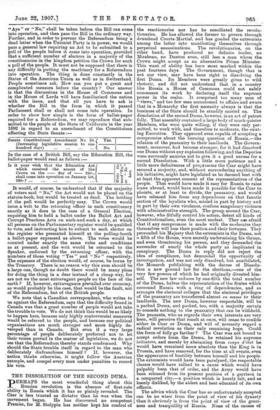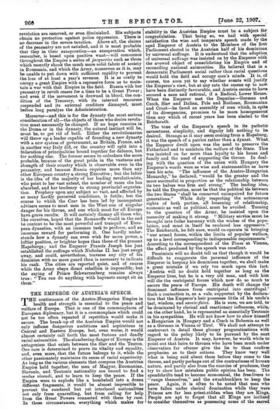THE DISSOLUTION OF THE SECOND DUMA.
PERHAPS the most wonderful thing about this Russian revolution is the absence of first-rate ability in Russia which it has so plainly revealed. The °tar is less trusted as dictator than be was when. the movement began. He has discovered no competent Premier, for M. Stolypin has neither kept his control of the reactionaries nor has he conciliated the revolu- tionaries. He has allowed the former to govern through drumhead Courts-Martial, and has goaded the extremists among the latter into- manifesting themselves through perpetual assassinations. The revolutionaries, on the other hand, have produced no definite leader, no Mirabeau, no Danton even, still less a man whom the Crown might accept as an alternative Prime Minister. This want of ability has been most marked within the past fourteen days. The Government, though that is not our view, may have been right in dissolving the first Duma. Its Members were greatly given to wild rhetoric, and did not understand that in a country like Russia a House of Commons could not safely commence its work by declaring itself the supreme power in the realm. It comprised too many men of "views," and too few men accustomed to affairs and aware that in a Monarchy the first necessity always is that the business of the State should be steadily carried on. The dissolution of the second Duma, however, is an act of patent folly. That assembly contained a large body of much quieter Members, who were quite willing, if they were only per- mitted, to work with, and therefore to moderate, the exist- ing Executive. They appeared even capable of accepting a compromise about the burning question of Russia,—the relation of the peasantry to their landlords. The Govern- ment, moreover, had become stronger, for it had dissolved one Du ma without any explosion following, and the Deputies were nervously anxious not to give it a good excuse for a second Dissolution. With a little more patience and a little more definiteness of programme the Czar might have secured a majority, and, without surrendering anything of his initiative, might have legislated as he deemed best with at least the apparent consent of the representatives of the people. That would have made it easy for Russia to raise loans abroad, would have made it possible for the Czar to placate, or at least to divide, the peasantry, and would have released him from any dependence on that fanatic section of the loyalists who, misled in part by history and in part by their own virulence, confuse sanguinary violence with administrative strength. The group around the Czar, however, who fitfully control his action, detest all kinds of Constitutionalism, even the most modest. They aye afraid that if any compromise is made with the moderates they themselves will lose their position and their fortunes. They persuaded his Majesty that the extremists in the Duma, not a fifth of the House, were secretly undermining his throne, and even threatening his person, and they demanded the surrender of nearly the whole party as implicated in conspiracy. The Duma in reply did not reject the idea of compliance, but demanded the opportunity of investigation, and was not only dissolved, but annihilated, the Monarch publishing with the decree of Dissolu- tion a new ground law for the elections,—one of the very few powers of which he bad originally divested him- self. The new law reduces by one-fifth the total number of the Duma, halves the representation of the States which surround Russia with a ring of dependencies, and so arranges the electoral colleges that the electoral privileges of the peasantry are transferred almost en masse to their, landlords. The new Duma, however respectable, will be a packed Duma, and packed, too, with a majority certain to concede nothing to the peasantry that can be withheld. The peasants, who. as regards their own interests are very keen, will perceive that result at once, will cease to confide either in Czar or Duma, and will of necessity regard a radical revolution as their only remaining hope. Could the force of folly go farther ? The Czar was not bound to accept orders from the Duma, he retained his supreme initiative, and merely by abstaining from coups d'elat he would have remained more absolute than the King is in Prussia, and have removed, for the time at all events, even the appearance of hostility between himself and his people. The extremists would have been paralysed, the respectable classes would have rallied to a cause which would have palpably been that of order, and the Army would have been released from its present position of a garrison in a conquered city,—a position which is keenly felt, and as keenly disliked, by the ablest and best educated of its own officers.
The advice which the Czar has so unfortunately accepted can be no wiser front the point of view of his dynasty than it obviously is from the point of view of the great- ness and tranquillity of Russia. None of the causes of
revolution are removed, or even diminished. His subjects obtain no protection against police oppression. There is no decrease in the severe taxation. Above all, the claims of the peasantry are not satisfied, and it is most probable that they in their exasperation—an exasperation which, remember, is based upon positive want—will commence throughout the Empire a series of jacqueries such as those which recently shook the much more solid fabric of society in Roumania, and which the Army, numerous as it is, may be unable to put down with sufficient rapidity to prevent the loss of at least a year's revenue. It is as costly to occupy a great Empire with a repressive force as to main- tain a war with that Empire in the field. Russia with her peasantry in revolt ceases for a time to be a Great Power ; and even if the movement is drowned in blood, the con- dition of the Treasury, with its internal resources suspended and its external creditors dismayed, must before long paralyse the Administration.
Moreover—and this is for the dynasty the most serious consideration of all—the objects of those who desire revolu- tion must necessarily be changed. If no hope remains in the Duma or in the dynasty, the natural instinct will be, must be, to get rid of both. Either the revolutionaries will throw up a leader capable of founding a new dynasty with a new system of government, as Britain, France, and in another way Italy did, or the country will split into a federation of principalities bound together for defence, but for nothing else. The former seems to onlookers the more probable, because of the great pride in the vastness and strength of their country which is observable even in the peasantry, and because Russia requires more than any other European country a strong Executive ; but the latter is the idea of the majority of her leading revolutionists, who point to her vast extent, the number of races she has absorbed, and her tendency to strong provincial organisa- tion. Prophecy upon any subject so vast, and affected by so many hardly perceived conditions, is futile; but the course to which the Czar has been led by incompetent advisers seems to most men in the West one of singular danger for his throne, and one which must for all Europe have grave results. It will certainly dismay all those who, like ourselves, hoped that the Romanoffs would in the end be content to be the most powerful and tranquil of Euro. pean dynasties, with an immense task to perform, and an immense reward for performing it. One hardly under- stands how a dynasty can even wish for more power, a loftier position, or brighter hopes than those of the present Hapsburgs ; and the Emperor Francis Joseph has just established the suffrage which Nicholas II. has just swept away, and could, nevertheless, traverse any city of his dominion with no more guard than is necessary to indicate his rank. The cities are reported quiet, and of course while the Army obeys direct rebellion is impossible; but the saying of Prince Schwarzenberg remains always true : " You can do anything with bayonets except sit on them."











































 Previous page
Previous page